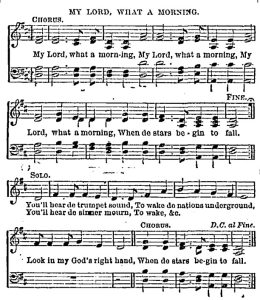In Eileen Southern’s writing, there were a lot of passages where she talked about hymnals and prayer music. She also introduced us to different practices, traditions and schools of psalmody singing, which all work with each other in the dome of music sung and played by the enslaved. While in class and doing readings, I have been thinking about what the music actually sounds like when they were sung by the enslaved African Americans: will they add their own harmonies? Any changes to the melodies? I found a source that also aimed to look into that.
https://www.proquest.com/americanperiodicals/docview/136697087/63A6277D9EA4D3APQ/3?accountid=351
This is an article that is, in my opinion, “woke” for the time. The point of view of this article is neutral and unarrogant (unlike a lot of writings from that time), respectful of the culture, and the author acknowledges that more research needs to be done. The title of this article is Music: The Slave as a Revitalist. It was written by Horatio C. King, and was published in the Christian Union periodical on January 26, 1876. This article analyzed the music of African American religious gatherings (that are referred to in text as “sperichuals”… so is it spirituals?), and King provided information on what that is like, “To a stranger the peculiarity most striking is the intense emotion which pervades their singing and prayers as well as their preaching (pp. 78).” The outpour of emotions is not the only thing that stood out to him; he highlighted the importance of singing by stating that a meeting without singing will not accomplish much, and will also not uplift and enlighten people (pp. 78).
King also pointed out s ome of the problems he encountered in his research. He stated that the harmonized melodies in the articles “must not be inferred that the ex-slaves sing thus strictly; nor on the other hand that they sing only in unison (pp. 78).” This is a slippery slope when it comes to musicological research because when music from a non-European tradition is transcribed into staff notes… you might lose some of that spice. King used the word “weird” when describing the tones of the music, and he is not the only one: in another periodical article, Penick, someone who is not a musician, said, “I am not able to analyze the weird melodies of the negroes.” (pp. 33) I bet some of that “weirdness” is lost in translation.
ome of the problems he encountered in his research. He stated that the harmonized melodies in the articles “must not be inferred that the ex-slaves sing thus strictly; nor on the other hand that they sing only in unison (pp. 78).” This is a slippery slope when it comes to musicological research because when music from a non-European tradition is transcribed into staff notes… you might lose some of that spice. King used the word “weird” when describing the tones of the music, and he is not the only one: in another periodical article, Penick, someone who is not a musician, said, “I am not able to analyze the weird melodies of the negroes.” (pp. 33) I bet some of that “weirdness” is lost in translation.
I felt a bit lost with the property of this source, because it occurred to me that it is a combination of primary and secondary sources. It was written back in the days, and it has music scores from that time. However, it clearly states that some of the sources King cited were melodies heard from other people, and he understood that the melodies can’t be fully dictated, thus making it less authentic… Maybe this is the curse of doing research! 🙂 I think this topic is very interesting because you can’t avoid the discussion around authenticity, and the author approached the topic in an interesting way by combining African Americans’ religious life with their musical practices, and I find that quite interesting.
Works Cited
King, Horatio C. “Music.: THE SLAVE AS A REVIVALIST. THE OLD ARK’S MOVING. MY LORD, WHAT A MORNING. RISE AND SHINE.” Christian Union (1870-1893), vol. 13, no. 4, Jan 26, 1876, pp. 78. ProQuest, https://www.proquest.com/magazines/music/docview/136697087/se-2?accountid=351.
Penick, C. C. “NEGRO MUSIC AND FOLK LORE.” The Musical Visitor, a Magazine of Musical Literature and Music (1883-1897), vol. 24, no. 2, 02, 1895, pp. 33. ProQuest, https://www.proquest.com/magazines/negro-music-folk-lore/docview/137503923/se-2?accountid=351.
Southern, Eileen. The Music of Black Americans, 3rd Edition. New York, W. W. Norton & Company, 1997.
